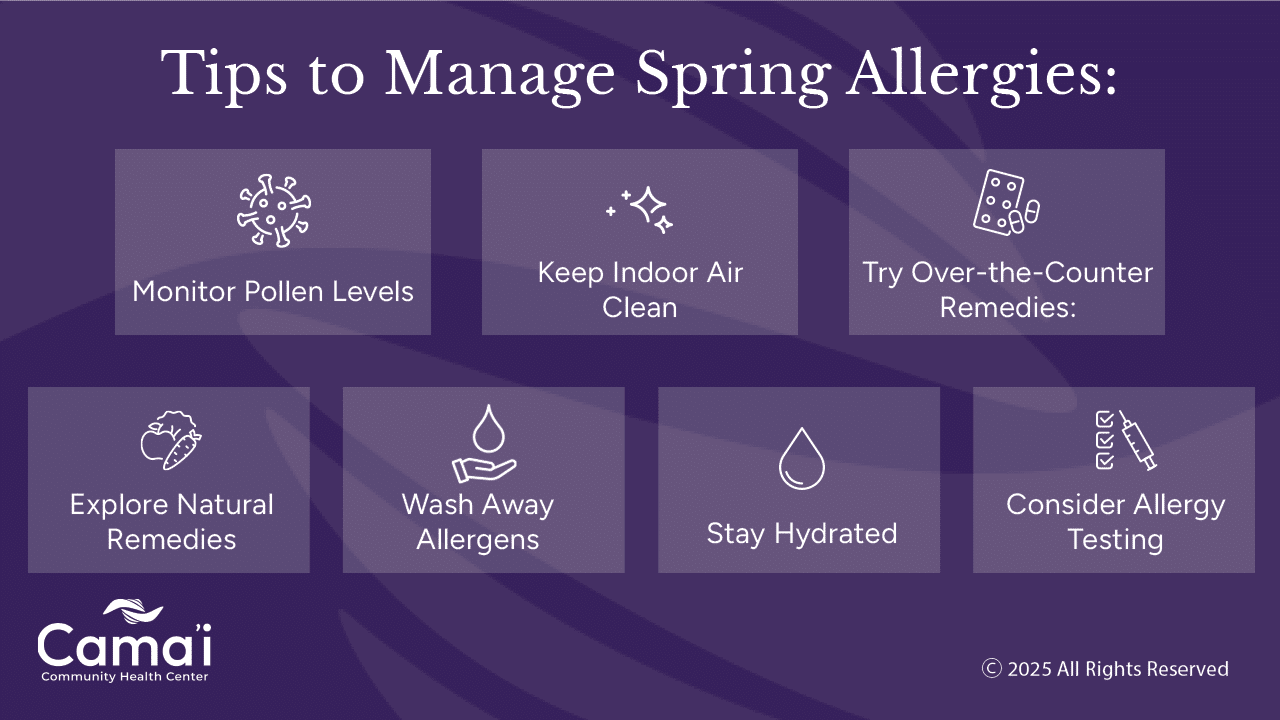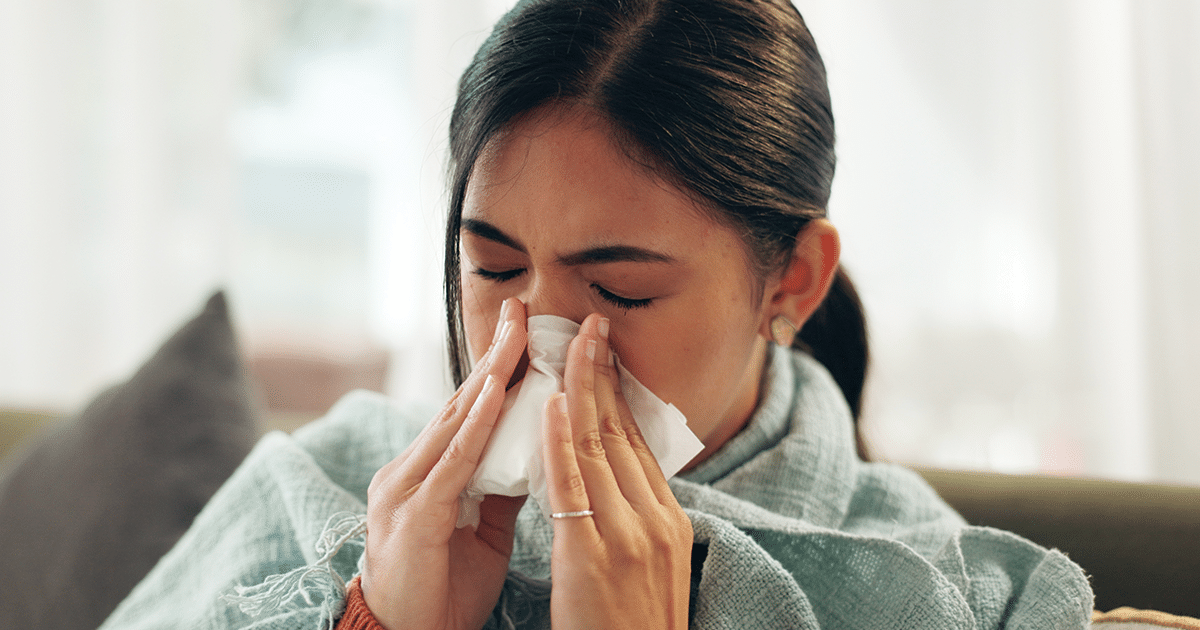Spring in Alaska is a time of renewal. The days grow longer, the ice begins to melt, and communities emerge from winter’s deep freeze to enjoy the changing season. But along with the excitement of spring come seasonal health challenges unique to rural Alaska.
From managing allergies to staying active after a long winter and preparing for the upcoming fishing season, it’s important to take proactive steps to maintain good health and well-being that will last the entire year. This guide will offer practical tips to keep you healthy, happy, and ready to take on what spring has to offer in beautiful Alaska.
Spring is the perfect time for a wellness reset—schedule a visit with our healthcare team at Cama’i Community Health Center to start the season feeling your best!
Managing Spring Allergies in Alaska
As the snow melts and plants begin to bloom, and cold weather begins warming, many people experience seasonal allergies. Pollen from trees and grasses and mold from melting snow can trigger symptoms like sneezing, congestion, itchy eyes, and fatigue. The Allergy, Asthma, & Immunology Center of Alaska reminds us that in Alaska, the short growing season means plants maximize every available hour of natural sunlight. As spring arrives, tree pollen surges, with birch being a particularly strong allergen. Here are some tips to manage spring allergies effectively:

- Monitor Pollen Levels: Stay informed about local pollen forecasts and try to limit outdoor activities when pollen counts are high.
- Keep Indoor Air Clean: Upgrade heating systems, use air purifiers, change HVAC filters regularly, and keep windows closed on high-pollen days.
- Wash Away Allergens: Shower and change clothes after spending time outdoors to remove pollen from your skin and clothing.
- Try Over-the-Counter Remedies: Antihistamines, nasal sprays, and decongestants can help provide relief from allergy symptoms. Consult a healthcare provider if symptoms persist.
- Explore Natural Remedies: Some people find relief from local honey, saline nasal rinses, or herbal teas that support respiratory health.
- Stay Hydrated: Drinking plenty of water can help flush allergens from your system and keep your sinuses clear.
- Consider Allergy Testing: If you’re struggling with allergies, consult a healthcare provider for allergy testing and personalized treatment options.
If allergies interfere with your daily life, consider scheduling an appointment with a healthcare provider to discuss treatment options that work best for you.
Staying Active After a Long Winter
The long, cold winter months can make it challenging to stay active. As spring arrives, it’s the perfect time to reintegrate movement into daily life. Whether you’re eager to get outside or looking for low-impact ways to boost your fitness, here are some strategies to ease back into physical activity:
- Start Slowly: If you’ve been less active during winter, begin with gentle activities like walking, stretching, or yoga to wake up your muscles and joints.
- Take Advantage of Longer Days and Natural Sunlight: Use the extra daylight hours to go for a walk, hike, or bike ride in your community.
- Join Community Activities: Many rural Alaskan communities host spring events, group hikes, or cultural activities that encourage movement and connection.
- Try Home Workouts: If outdoor conditions are still unpredictable, indoor exercises like bodyweight workouts, resistance bands, or dance routines can help maintain fitness.
- Get Enough Sleep: Rest is vital for maintaining balance in physical activity and mental health.
- Listen to Your Body: Avoid overexertion, and gradually increase activity levels to prevent injuries.
- Engage in Outdoor Chores: Gardening, yard work, and preparing boats or equipment for fishing season are all great ways to incorporate movement into daily life.
- Find an Accountability Partner: A friend or family member can help you stay motivated to stick with an active routine.
Regular movement supports cardiovascular health, boosts mood, and helps prevent common conditions like high blood pressure and diabetes.
Preparing for Fishing Season
For many in rural Alaska, spring signals the start of fishing season. Whether fishing for sustenance, income, or recreation, preparation is key to a safe and successful season. Consider these health and safety tips:
Physical Readiness
Fishing requires endurance, strength, and stamina. Prepare your body by engaging in exercises that improve balance, flexibility, and strength. Core exercises, leg strengthening, and cardiovascular conditioning can help prevent strain and injuries while out on the water.
- Improve Grip Strength: Handling fishing gear and hauling in catches can put strain on your hands and wrists. Exercises that strengthen your grip can reduce the risk of injury.
- Enhance Flexibility: Stretching before and after long fishing trips can help prevent stiffness and muscle fatigue.
- Practice Proper Lifting Techniques: Bending at the knees, engaging your core, and avoiding twisting motions can help protect your back from strain.
Gear and Safety Checks
- Inspect Equipment: Check fishing gear, boats, and safety equipment for wear and tear before heading out.
- Stock First Aid Kits: Ensure your first aid kit is stocked with bandages, antiseptics, seasickness medication, and other essentials.
- Wear Proper Protective Gear: Invest in high-quality waterproof gear, life jackets, and gloves to protect against cold water and unpredictable weather.
- Know Emergency Protocols: Review safety procedures, including how to respond to hypothermia, dehydration, and overexertion.
- Have a Communication Plan: Ensure you have a way to call for help in case of emergency, such as a satellite phone or marine radio.
Nutrition and Hydration
- Stay Hydrated: Even in cooler temperatures, dehydration can occur. Drink plenty of water throughout the day.
- Eat Nutritious Meals: Fuel your body with high-protein foods, whole grains, and healthy fats to maintain energy levels while working long hours.
- Pack Healthy Snacks: Nuts, dried fruit, and protein bars can provide quick, nutritious energy during long fishing trips.
- Limit Caffeine and Alcohol: While a cup of coffee can help with alertness, excessive caffeine or alcohol can lead to dehydration and fatigue.
Mental Well-being
Fishing can be physically and mentally demanding. Prioritize sleep, manage stress, and stay connected with loved ones to maintain a healthy mindset during the season.
- Practice Mindfulness: Deep breathing, meditation, and relaxation techniques can help reduce stress and improve focus.
- Take Breaks When Needed: Listen to your body and avoid pushing yourself beyond safe limits.
- Maintain Social Connections: If you’re away for extended periods, regular check-ins with family and friends can help support mental well-being.
General Spring Health Tips
In addition to allergies, activity, and fishing preparation, consider these general wellness tips as you transition into spring:
infographic
- Boost Immunity: Eat a diet rich in vitamin D, fresh fruits, vegetables, and lean proteins to support your immune system.
- Protect Against Sun Exposure: With longer daylight hours, wear sunscreen, sunglasses, and protective clothing to prevent sunburn and UV damage.
- Maintain Good Sleep Habits: Longer daylight hours can disrupt sleep and cause trouble sleeping. Try to stick to a consistent bedtime routine to ensure restful sleep.
- Check in with Your Healthcare Provider: Spring is a great time to schedule routine check-ups, dental exams, and any necessary screenings.
- Be Aware of Seasonal Mental Health Changes: Some people experience mood shifts as the seasons change. If you notice increased anxiety or depression, consider reaching out for support.
Embracing Spring with a Healthy Mindset
Spring is a season of renewal, offering a chance to refocus on health and well-being. Whether it’s managing allergies, getting back into an active routine, or preparing for fishing season, small, intentional steps can make a big difference in overall health.
At Cama’i Community Health Center, we’re here to support your wellness journey. If you need medical advice, allergy relief, or guidance on staying active, our team is ready to help.
Let’s make this spring a season of health, vitality, and connection in our communities! Contact Cama’i Community Health Center for expert advice on managing seasonal health challenges!


